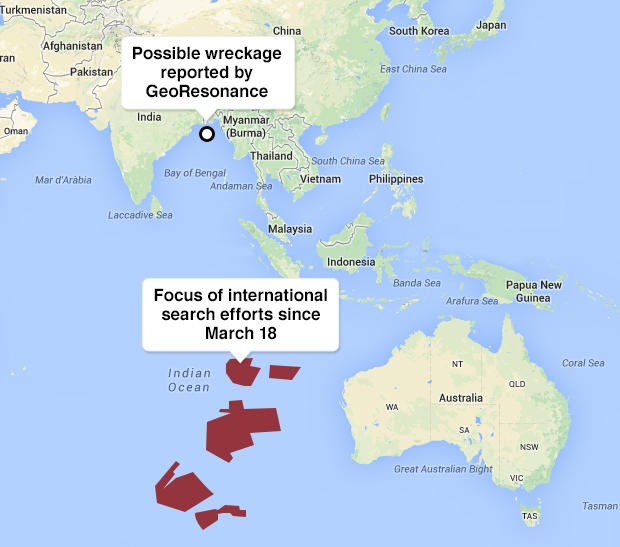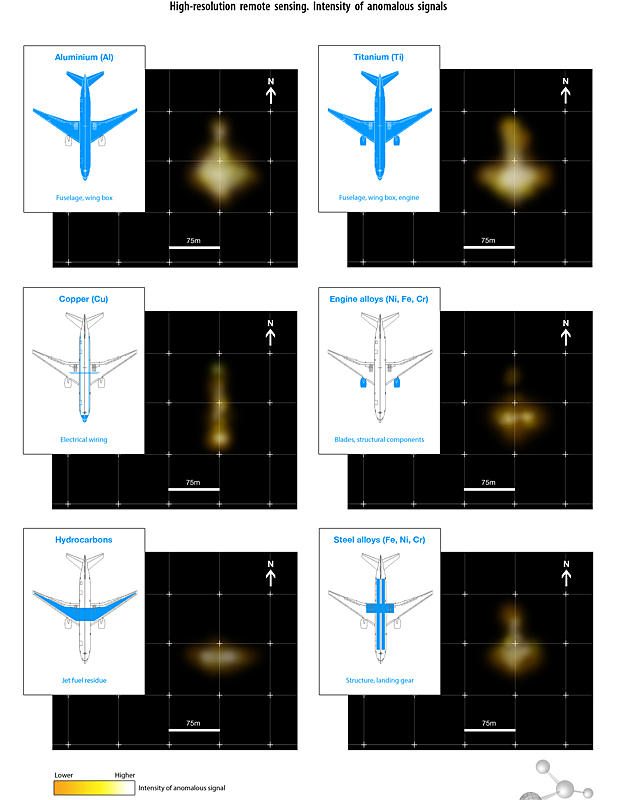La primer noticia interesante en semanas:
http://mexico.cnn.com/mundo/2014/04/29/vuelo-370-malaysia-airlines-avion-malasio-desaparecido
El hallazgo de una empresa causa división en la búsqueda del vuelo 370
La compañía GeoResonance dice tener indicios del avión malasio, pero ser ignorada por las autoridades
(CNN) — Una compañía privada asegura haber encontrado lo que cree son restos de un avión en el oceáno, aunque los líderes de la búsqueda del avión desaparecido de Malaysia Airlines lo han descartado.
Las razones para el escepticismo son obvias, el sitio donde GeoResonance dice haber encontrado los restos, en la bahía de Bengala, está a varios miles de kilómetros lejos de la área actual de búsqueda en el sur del oceáno Índico.
El Centro de Coordinación de Agencias Conjuntas, que coordina la búsqueda multinacional lo descartó.
"La búsqueda liderada por Australia se basa en información satelital y otros datos para determinar la localización de la aeronave desaparecida", dijo el centro.
"La localización especificada en el reporte de GeoResonance no va con el arco de búsqueda derivada de esos datos. El equipo conjunto internacional está convencido que el lugar donde cayó la aeronave está en la porción sur del arco de búsqueda".
El ministro de transporte malasio Hishammuddin Hussein dijo que Malasia "está trabajando con sus socios internacionales para corroborar la credibilidad de esa información".
GeoResonance agregó que está analizando campos electromagnéticos súper débiles capturados por imágenes aéreas multiespectrales.
"La compañía no está declarando que este es el MH370, sin embargo, debe ser investigado", señaló GeoResonance en un comunicado.
El director de la compañía, David Pope, dijo que no quería hacer pública la información al principio, pero sus datos estaban siendo ignorados.
"Somos un gran grupo de científicos y estábamos siendo ignorados, y nos pareció que teníamos la obligación moral de compartir nuestras conclusiones con las autoridades", dijo a CNN este martes.
La tecnología de GeoResonance fue creada para buscar armas nucleares, biológicas y químicas bajo el océano, o búnkers, dijo Pope. La compañía comenzó su búsqueda cuatro días después de que el avión se perdió y envió a funcionarios la información que encontraron el 31 de marzo, dijo Pope, y después un reporte completo el 15 de abril.
Pope aseguró que autoridades contactaron a GeoResonance este martes y dijeron estar "muy interesados, y emocionados" sobre los hallazgos.
Inmarsat, la compañía cuyo satélite tuvo el último contacto con el vuelo 370, se mantiene "muy segura" en sus análisis de que el avión teminó en el sur del océano Índico, dijo a CNN una fuente cercana a la investigación.
El análisis de Inmarsat está "basado en física y matemáticas comprobables", dijo la fuente, y ha sido revisada por las autoridades de Estados Unidos, Gran Bretaña y de Malasia, así como una compañía de satélite independiente.
Búsqueda aérea finaliza
La mayor parte de las tripulaciones aéreas internacionales llegarán a la Base Pearse de la Fuerza Aérea Real Australiana, cerca de la ciudad de Perth, en los próximos días.
La probabilidad de encontrar restos del avión en la superficie del océano es "altamente improbable", dijo este lunes el primer ministro australiano, Tony Abbott. La mayoría de los escombros probablemente están hundidos, agregó.
Así que los funcionarios están entrando a la siguiente fase: una
búsqueda más intensa bajo el agua en la cual participarán contratistas privados y podría costar alrededor de 56 millones de dólares.
Las tripulaciones recorrerán
un área mucho mayor del fondo del mar, de 60,000 kilómetros cuadrados. El proceso podría tomar al menos de seis a ocho meses, dijeron las autoridades.
La sonda submarina Bluefin-21 continuará escaneando el fondo del océano. Pero el sumergible no pudo buscar este martes debido al mal tiempo y a la marea alta.
Nadie sabe exactamente qué pasó con el MH370, que desapareció el 8 de marzo con 239 personas a bordo. El avión se dirigía desde Kuala Lumpur, Malasia, a Beijing, China.
Nuevos detalles
Familiares de los pasajeros chinos han estado furiosos por la aparente falta de información proporcionada por las autoridades de Malasia.
Pero este martes, los funcionarios dieron un reporte a decenas de familiares en Beijing y reprodujeron el audio de la charla final de los pilotos con una torre de control, lo cual no había ocurrido antes.
"Malaysia tres siete cero contacto Ho Chi Min 120.9, buenas noches", dice una voz identificada por los funcionarios malasios como la de un controlador de radar en Kuala Lumpur.
"Buenas noches, Malaysian tres siete cero", responde una voz de hombre que se cree que es un miembro de la tripulación del avión.
Los funcionarios también mostraron a miembros de la familia mapas de la ruta del vuelo, incluido un viraje desconcertante en Penang, sobre el estrecho de Malaca. Eso sacó al avión fuera de su curso.
El representante de Malaysia Airlines Subas Chandran dijo que el avión probablemente se quedó sin combustible cerca de las siete horas y media en el vuelo.
Tales detalles, aunque dan a qué pensar, fueron bienvenidos por los familiares.
"Se están haciendo progresos", dijo Jimmy Wang, miembro del comité de las familias que buscan respuestas.
Ivan Watson colaboró con este reporte.
http://www.cbsnews.com/news/malaysi...ance-wreckage-of-a-commercial-airliner-found/
Malaysia Airlines Flight 370: GeoResonance survey company says "wreckage of a commercial airliner" found
A graphic from GeoResonance shows images depicting underwater "anomalies" suggesting deposits of various metals in the approximate formation of a passenger airliner on the floor of the Bay of Bengal. GeoResonance
Last Updated Apr 29, 2014 3:00 PM EDT
The Malaysian government confirmed Tuesday that officials investigating the disappearance of Malaysia Airlines Flight 370 were looking into an Australian company's claim to have located aircraft wreckage on the sea floor in the northern Bay of Bengal -- thousands of miles from the search area scanned meticulously for weeks to the south.
Australian land and sea survey company GeoResonance said in a statement sent Tuesday to CBS News that it had discovered materials "believed to be the wreckage of a commercial airliner" about 100 miles south of Bangladesh in the Bay of Bengal using proprietary
technology which scans vast areas for specific metals or minerals.
Malaysia-Airlines Search/findings Map
CBS
The company's technology is often used to help clients find mineral deposits for mining, but GeoResonance also has participated in the hunt for old warships or aircraft on the ocean floor.
"During the search for MH370, GeoResonance searched for chemical elements that make up a Boeing 777: aluminum, titanium, copper, steel alloys, jet fuel residue, and several other substances. The aim was to find a location where all those elements were present," said the company in the written statement.
Scanning "multispectral images" taken from the air on March 10 -- two days after Flight 370 went missing -- GeoResonance says it found "an anomaly in one place in the Bay of Bengal" where many of those relevant materials were detected in significant amounts, and in a pattern which matched the approximate layout of a large aircraft.
A graphic from GeoResonance shows images depicting underwater "anomalies" suggesting deposits of various metals in the approximate formation of a passenger airliner on the floor of the Bay of Bengal.
GeoResonance
The company said analysis of images take of the same area five days earlier showed the "anomaly had appeared between the 5th and 10th of March 2014."
In a statement released to the press on Tuesday, Malaysian Acting Minister of Transport Hishammuddin Hussein confirmed that his government was "working with its international partners to assess the credibility of this information."
A U.S. official with knowledge of the investigation told CBS News on Tuesday that they were still in the early stages of gathering information about GeoResonance's claim, but they were "very skeptical" it would lead to anything, given all the data that investigators have been working with points to the southern Indian Ocean.
A team of experts working for the International Investigation Team have been studying the data available on the flight, which includes the
attempted communications between Flight 370 and satellites which led officials to focus their search in the so-called Southern Arc. They continue to analyze that data and their focus remains to the south, says CBS News transportation correspondent Jeff Pegues.
British satellite company Inmarsat provided the relevant data to the Malaysian government -- a final seven "pings" recorded from the plane to the satellite. Based on those pings alone, two possible flight paths for the plane were charted from its last known location; one heading north toward the Bay of Bengal, and the other heading south into the Indian Ocean.

Play Video
Special Report: Malaysian P.M. says new data shows missing plane plunged into southern Indian Ocean
On March 24,
Malaysian Prime Minister Najib Razak announced that, based on new analysis of that data, Inmarsat and the lead investigators had "concluded that MH370 flew along the southern corridor, and that its last position was in the middle of the Indian Ocean, west of Perth."
Reached Tuesday by CBS News, Inmarsat Vice President Chris McLaughlin said the decision to focus the search for the missing jet solely in the southern corridor was made by the Malaysian government and its search partners, not Inmarsat.
McLaughlin noted that the data was scrutinized by experts from a variety of different countries, and "all agreed the aircraft came down in the southern Indian Ocean."
One of the primary factors in that decision, according to McLaughlin, was the fact that not a single nation along the northern corridor -- which includes the Bangladeshi coast -- reported picking the plane up on domestic radar.

Play Video
How did satellite company determine fate of Malaysia Airlines plane?
When the decision to focus on the southern Indian Ocean was made, CBS News' Pegues reported that Inmarsat had also contributed one more piece of evidence which helped guide the move: the so-called Doppler effect.
By measuring the sound waves from the plane's final pings, engineers from Inmarsat were able to determine the aircraft's location relative to the satellite; it's the same effect that makes an approaching vehicle sound different to the human ear than one moving away. The analysis of this data from Inmarsat suggested the plane had travelled south, reported Pegues.
Inmarsat engineers compared Flight 370's direction and speed against six other Boeing 777s flying the same day in various directions. The findings were said to confirm the plane could not have gone north, and instead most likely crashed in the southern Indian Ocean.
There have been
many false leads in the hunt for the Malaysia Airlines Boeing 777-200 since it disappeared from commercial radar northeast of Manila on March 8.
Investigators still believe the plane made an inexplicable about-face after losing contact, heading southwest into the Indian Ocean.

Play Video
Australian PM says Flight 370 search will now focus on ocean floor
Officials said Monday that with not a clue found to date, the huge search area about 1,000 miles southwest of Perth, Australia -- which has been combed fastidiously by a robotic U.S. Navy submarine using sonar imaging -- would be
expanded significantly and the
air search called off.
"It is highly unlikely at this stage that we will find any aircraft debris on the ocean surface. By this stage, 52 days into the search, most material would have become waterlogged and sunk," Australian Prime Minister Tony Abbott said Tuesday.
"Therefore, we are moving from the current phase to a phase which is focused on searching the ocean floor over a much larger area," he said. That search, according to Abbott, could take at least eight months.
GeoResonance said it first alerted officials with Malaysia Airlines, and the Chinese and Malaysian embassies in Australia, that possible aircraft debris had been found in the general area of its discovery on March 31, "well before the black box batteries had expired."
"These details were also passed onto the Australian authorities (JACC) in Perth on April 4, 2014. A more detailed study was completed in early April. The final 23 page report including the precise location of the wreckage was passed onto Malaysian Airlines, Malaysian High Commission in Canberra, Chinese Embassy in Canberra, and the Australian authorities (JACC) on April 15, 2014," according to the company.
It was not immediately clear whether the international search team has previously investigated GeoResonance's information.



































 for him in Germany. They were contacted by his mother admitting she knew her son was using a false passport. In the evening Malaysian investigators summarized that there is no evidence suggesting there is a link between the disappearance of the aircraft and the use of false passports. Investigation continues however, the background of all passengers is being investigated, for example whether there are high life insurances.
for him in Germany. They were contacted by his mother admitting she knew her son was using a false passport. In the evening Malaysian investigators summarized that there is no evidence suggesting there is a link between the disappearance of the aircraft and the use of false passports. Investigation continues however, the background of all passengers is being investigated, for example whether there are high life insurances.







